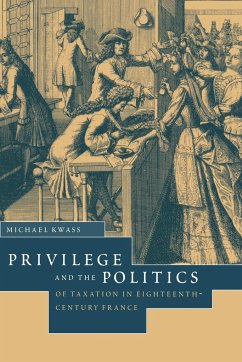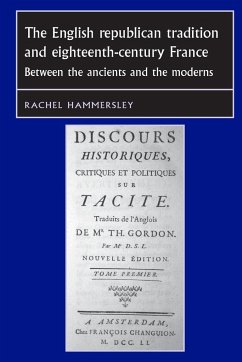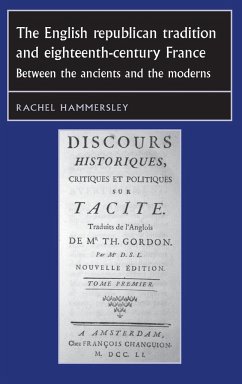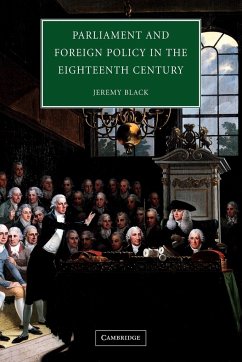
Privilege and the Politics of Taxation in Eighteenth-Century France
Liberte, Egalite, Fiscalite

PAYBACK Punkte
29 °P sammeln!
This book offers a lucid interpretation of the Ancien Régime and the origins of the French Revolution.Privilege and the Politics of Taxation in Eighteenth-Century France offers a lucid interpretation of the Ancien Régime and the origins of the French Revolution. It examines what was arguably the most ambitious project of the eighteenth-century French monarchy: the attempt to impose direct taxes on formerly tax-exempt privileged elites. Connecting the social history of the state to the study of political culture, Michael Kwass describes how the crown refashioned its institutions and ideol...
This book offers a lucid interpretation of the Ancien Régime and the origins of the French Revolution.
Privilege and the Politics of Taxation in Eighteenth-Century France offers a lucid interpretation of the Ancien Régime and the origins of the French Revolution. It examines what was arguably the most ambitious project of the eighteenth-century French monarchy: the attempt to impose direct taxes on formerly tax-exempt privileged elites. Connecting the social history of the state to the study of political culture, Michael Kwass describes how the crown refashioned its institutions and ideology to impose new forms of taxation on the privileged. Drawing on impressive primary research from national and provincial archives, Kwass demonstrates that the levy of these taxes, which struck elites with some force, not only altered the relationship between monarchy and social hierarchy, but also transformed political language and attitudes in the decades before the French Revolution. Privilege and the Politics of Taxation in Eighteenth-Century France sheds light on French history during this crucial period.
Review quote:
"Richly documented and theoretically and methodologically sophisticated, Kwass's book will be requisite reading for anyone interested in the long-term political, social, and ideological origins of the French Revolution."
American Historical Review
"...a significant contribution to our understanding of the politics of the Old Regime and its legacy to the Revolution."
Journal of Modern History
"Kwass...examines the ambitious project of the 18th-century French monarchy to impose direct taxation on formerly tax-exempt privileged elites. He describes how the crown refashioned its institutions between monarchy and social hierarchy, but also transformed political language and attitudes in the decades before the French Revolution."
Reference Research Book News
"...an exceptionally readable and thorough work..."
Choice
"...brief summary cannot do justice to the author's skillfully developed argument, which is butressed by abundant documentation drawn from a wide variety of archival and secondary sources. Cambridge University Press has enhanced the text by including illustrations and charts as well as an extensive index...Privilege and the Politics of Taxation in Eighteenth-Century France contributes substantially to our understanding of why and how the French Revolution happened."
The Historian
"...a compelling study of the ways in which tax reform undermined the old regime and helped to create the republican political culture of the Revolution."
H-FRANCE
Table of contents:
List of illustrations; List of figures; List of tables; Acknowledgements; List of abbreviations; Introduction: why taxes?; Part I. Reassessing Privilege: 1. The economy of privilege and the challenge of universal taxation; 2. A kingdom of taxpayers; Part II. The Politics of Taxation and the Language of Dispute: 3. Petitioning for 'justice': tax disputes in the administrative sphere; 4. Taking 'liberty' to the public: tax disputes in the institutional sphere; 5. Taxation, Enlightenment and the printed word: debate in the literary sphere; Part III. From Resistance to Revolution: 6. Turning taxpayers into citizens: reform, revolution and the birth of modern political representation; Conclusion: liberté, égalité, fiscalité; Select bibliography; Index.
Privilege and the Politics of Taxation in Eighteenth-Century France offers a lucid interpretation of the Ancien Régime and the origins of the French Revolution. It examines what was arguably the most ambitious project of the eighteenth-century French monarchy: the attempt to impose direct taxes on formerly tax-exempt privileged elites. Connecting the social history of the state to the study of political culture, Michael Kwass describes how the crown refashioned its institutions and ideology to impose new forms of taxation on the privileged. Drawing on impressive primary research from national and provincial archives, Kwass demonstrates that the levy of these taxes, which struck elites with some force, not only altered the relationship between monarchy and social hierarchy, but also transformed political language and attitudes in the decades before the French Revolution. Privilege and the Politics of Taxation in Eighteenth-Century France sheds light on French history during this crucial period.
Review quote:
"Richly documented and theoretically and methodologically sophisticated, Kwass's book will be requisite reading for anyone interested in the long-term political, social, and ideological origins of the French Revolution."
American Historical Review
"...a significant contribution to our understanding of the politics of the Old Regime and its legacy to the Revolution."
Journal of Modern History
"Kwass...examines the ambitious project of the 18th-century French monarchy to impose direct taxation on formerly tax-exempt privileged elites. He describes how the crown refashioned its institutions between monarchy and social hierarchy, but also transformed political language and attitudes in the decades before the French Revolution."
Reference Research Book News
"...an exceptionally readable and thorough work..."
Choice
"...brief summary cannot do justice to the author's skillfully developed argument, which is butressed by abundant documentation drawn from a wide variety of archival and secondary sources. Cambridge University Press has enhanced the text by including illustrations and charts as well as an extensive index...Privilege and the Politics of Taxation in Eighteenth-Century France contributes substantially to our understanding of why and how the French Revolution happened."
The Historian
"...a compelling study of the ways in which tax reform undermined the old regime and helped to create the republican political culture of the Revolution."
H-FRANCE
Table of contents:
List of illustrations; List of figures; List of tables; Acknowledgements; List of abbreviations; Introduction: why taxes?; Part I. Reassessing Privilege: 1. The economy of privilege and the challenge of universal taxation; 2. A kingdom of taxpayers; Part II. The Politics of Taxation and the Language of Dispute: 3. Petitioning for 'justice': tax disputes in the administrative sphere; 4. Taking 'liberty' to the public: tax disputes in the institutional sphere; 5. Taxation, Enlightenment and the printed word: debate in the literary sphere; Part III. From Resistance to Revolution: 6. Turning taxpayers into citizens: reform, revolution and the birth of modern political representation; Conclusion: liberté, égalité, fiscalité; Select bibliography; Index.














